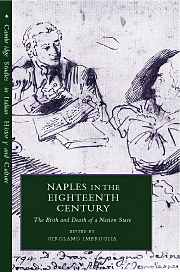Book contents
- Frontmatter
- Contents
- List of abbreviations
- Introduction
- 1 The capital and the provinces
- 2 The Court: power relations and forms of social life
- 3 The arrogance of the market: the economy of the Kingdom between the Mediterranean and Europe
- 4 Enlightenment in eighteenth-century Naples
- 5 The feudal question, judicial systems and the Enlightenment
- 6 Intellectuals and academies
- 7 Music and Enlightenment
- 8 Antiquarian studies in Naples at the end of the eighteenth century. From comparative archaeology to comparative religion
- 9 How not to finish a revolution
- Bibliography
- Index of names
- CAMBRIDGE STUDIES IN ITALIAN HISTORY AND CULTURE
7 - Music and Enlightenment
Published online by Cambridge University Press: 14 October 2009
- Frontmatter
- Contents
- List of abbreviations
- Introduction
- 1 The capital and the provinces
- 2 The Court: power relations and forms of social life
- 3 The arrogance of the market: the economy of the Kingdom between the Mediterranean and Europe
- 4 Enlightenment in eighteenth-century Naples
- 5 The feudal question, judicial systems and the Enlightenment
- 6 Intellectuals and academies
- 7 Music and Enlightenment
- 8 Antiquarian studies in Naples at the end of the eighteenth century. From comparative archaeology to comparative religion
- 9 How not to finish a revolution
- Bibliography
- Index of names
- CAMBRIDGE STUDIES IN ITALIAN HISTORY AND CULTURE
Summary
Opera was one of the most passionately debated subjects in the culture of eighteenth–century Europe: men of letters and Philosophes – the class of people who today would be defined as ‘intellectuals’ – continued over the entire century to inquire into its nature, its relationships with other forms of artistic expression (literature, visual arts, drama), and its aesthetic and social purposes. The debate became intense in France toward the end of the seventeenth century, when the birth of the tragédie en musique posed the problem of how and to what extent a theatrical work which was defined as a tragedy, but was set entirely to music, could be compatible with the rigorous principles of verisimilitude and decorum which marked the severe classicism of contemporary drama. From France the debate extended to Italy, where men of letters congregated at the turn of the century in the academy of ‘Arcadia’ with the purpose of saving Italian literature from the decadence into which the prevailing ‘bad taste’ of the Baroque had thrown it, and restoring it to classical form and the function of educating minds and improving morals. The Arcadians had singled out opera as a leading factor in that decadence. This form had been created with the aim of reviving the spirit of ancient Greek tragedy, but instead of restoring the original unity of word, music and action, it had only separated them further, and even subverted the hierarchy among them.
- Type
- Chapter
- Information
- Naples in the Eighteenth CenturyThe Birth and Death of a Nation State, pp. 135 - 153Publisher: Cambridge University PressPrint publication year: 2000
- 1
- Cited by



